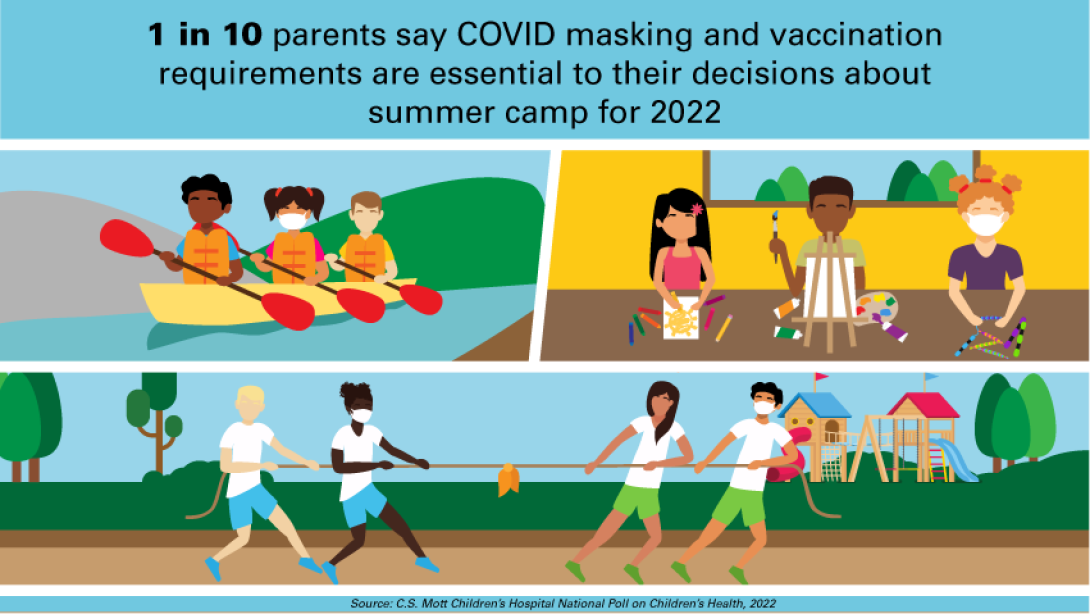Less than half of families rate general safety policies essential to camp decisions, with 1 in 10 rating COVID precautions as a critical factor.
11:16 AM
Author |

When it comes to picking a summer camp for kids, logistics top the checklist for most parents, a new national poll suggests.
And while families consider health and safety information, such as camp supervision and first aid training, less than half of parents rate general safety policies as essential to their camp decision, according to the University of Michigan Health C.S. Mott Children's Hospital National Poll on Children's Health.
Only half of parents also feel very confident they can tell if a summer camp is safe and healthy for their child.
"Parents often entrust camp staff with supervising their children for long days, even overnight, in the summer," said Mott Poll co-director Sarah Clark, M.P.H. "Camps offer great opportunities for enrichment, enjoying summer activities and making friends.
"But parents may not always consider whether the camps they're choosing are prepared to care for all campers' needs and respond to health and safety emergencies."
The nationally representative report is based on responses from 1,020 parents with at least one child ages six to 12 who were surveyed in April.

Nearly half of parents say they are considering either overnight or day camp for their child, with more than half expecting their child's participation to be a few weeks long.
Logistics like location, hours and cost were high on the list of parents' considerations, and for about two in five parents, activity offerings were essential influencers. Slightly less than a third of parents also said it was important that camps enforce limits on electronics and social media, and about one in six wanted to make sure their kids were outdoors.
Camper safet
When it comes to safety, nearly three in four parents say they look for information on the ratio of staff to children while more than three in five are interested in first aid training among staff and camp inspections or safety ratings. More than half are interested in emergency preparedness plans.
The majority of parents believe that if a camp is accredited, it's been inspected in the last one to two years and staff have received safety training.
Parents may not always consider whether the camps they're choosing are prepared to care for all campers' needs and respond to health and safety emergencies.Sarah Clark, M.P.H.
As families head into their third pandemic-era summer – and the first when kids under 12 are eligible for a COVID-19 vaccine – few say COVID precautions are essential to their camp decisions. But among those who do, three-quarters favor mask and vaccine requirements while a quarter prefer a camp with none of these mandates.
"Mandatory vaccination and masking may minimize disruptions to camp activities from a COVID outbreak and also limit the risk that campers pass on COVID to other family members," Clark said.
One in 12 parents report that a summer camp would need to accommodate their child's specific health issue, including allergies, medication need, physical disability, or mental health concerns.
"Parents should talk with the camp director to ensure the camp will be able to meet their child's health needs," Clark said. "Parents can't assume health-related information about their child has been shared with all appropriate groups."
What Clark suggests parents consider before sending their child to camp:
-
If campers will be in a remote area, such as a lake or a forest, ask about the camp's inclement weather policy and if there's a safe shelter available near the camp location.
-
If camps involve sports or other physical activities, ensure staff have basic first aid training and have supplies readily available. If camps include swimming, ask whether a certified lifeguard will be present.
-
If a child has health needs, meet the staff who will supervise the child to answer any questions and make sure they have the parent's emergency contact information readily available. Don't assume that information has already been communicated.
-
If the child has a food or other allergy, parents should ensure that emergency treatment (e.g., Epi-pen) will be available and that staff have been trained in its use.
-
If parents are considering overnight camp, they should assess the child's readiness to be away from home. If the child seems anxious, parents might arrange for them to talk with a previous camper or family friend who can share their experiences.
-
Be familiar with the camp's policies on masking and COVID vaccination and whether there are quarantine guidelines in the case of an outbreak or exposure.

Explore a variety of healthcare news & stories by visiting the Health Lab home page for more articles.

Department of Communication at Michigan Medicine
Want top health & research news weekly? Sign up for Health Lab’s newsletters today!





